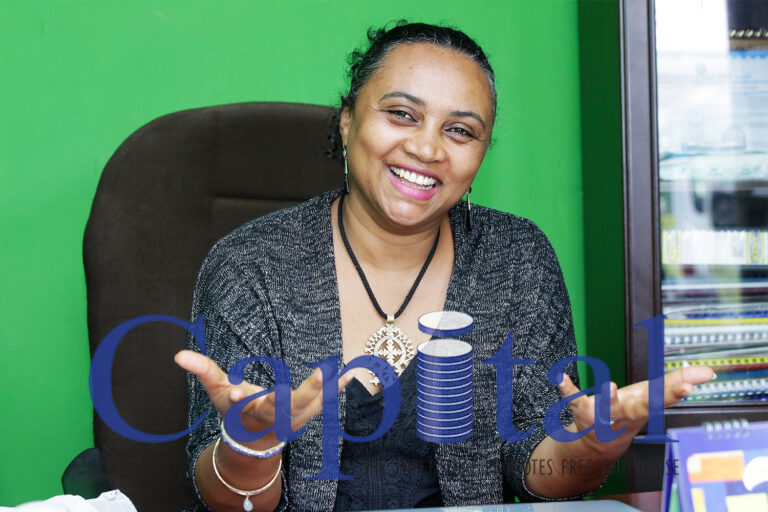Since the outbreak of the corona pandemic in Ethiopia most nongovernmental organization are facing financial challenges. Fikir Ethiopia National Association on Intellectual Disabilities is one of the NGOs working on intellectual disabilities. The association was established some 25 years ago by 89 parents of intellectually disabiled children. Mihret Nigussei is board chairperson of the association. Mihret started to work at the association after her immediate younger brother was born with intellectual disabilities. She started to work at Fikir Ethiopia as a volunteer and climbing up to become president of the association. Mihret says the association is facing challenges because in the last 25 years they were focusing on their work rather than promotion. Mihret said that the association is facing difficulty in the current situation and needs immediate help. Excerpts;
Capital: Can you tell us about Fikir Ethiopia National Association on Intellectual Disability?
Mihret Nigussei: Fikir Ethiopia was established 25 years ago by parents of intellectual disabilities. At the time there was no center for intellectually disable children except Mekane Eyesus church and Kokeb Atsebeha schools. Even those who got the chance to get in were obliged to leave after they reach their 18th birthday, they were not able to get the chance like other children to get enrolled in high schools and universities or technical and vocational schools. So after they turn 18 they are forced to stay home and this always make them face social, psychological and economical challenges. For example sexual harassment, an unexpected pregnancy, isolation from society and moreover some will be hidden by their parents in their home which results in additional distress. 
These things causes social crises, which led parents to establish this association as a solution for their children to interact and communicate with each other and with others.
More than 80 percent of our members are women. Mostly when this kind of children came to the family most families collapse and single mothers will be forced to stay with their children that caused them to face financial challenge to help the children.
Capital: How many centers do you have and how many children are you helping now?
Mihret: More than 3 percent of the world population is intellectually disabled which is around 200 million and from these numbers around 80 percent are expected to live in under developed countries like ours. So around 3 to 4 million intellectual disabilities are expected to live in our countries.
Even if our association was founded in Addis Ababa we have been trying to see other parts of the country. We understand that there are millions of intellectually disabled people living in our country and in a serious condition.
We have been working in 17 cities of five regions; we called for parents to work for their child and we try to bring them together and give different kind of support and assure their participation and beneficiary. In Addis Ababa we have two centers one found around the so called ‘Ferencay Legasion’ which is for kids bellow 18 years and the other found around ‘ Megenagna 22’ it is for adults above 18 years. In this center more than 90 intellectually disabled people came on a daily basis they are between 18-45 years old.
Capital: How are you treating them, is it easy to train adults above 18 with intellectual disability?
Mihret: It is very difficult; we find children isolated for a long time and sometimes they even cannot walk properly and speak, they don’t know how to communicate with others so they may disturb others. But there is one thing, they always think that everyone loves them and care for them and the good quality we have in our association is love. Since they came to us we always show them love and we will try to communicate with them.
Parents bring their children daily and we give them different kinds of trainings based on their potential.
And there is a peer influence, most of our staff are experienced and have been working for a long time with us so they know how to treat them based on their status.
We always try to make them think everyone has accepted them. Before we start the education we try to show them discipline and the system of the society.
Sometimes we get some children who don’t want to get training, but we try different methods to teach them.
Capital: Where does the association get financial supports to its activities?
Mihret: We get an annual support from the Ministry of Labor and Social Affairs since we are an association under the Ministry; however it is not enough to cover all our expenses so we always look and contact with individuals, companies, and stakeholders. For example if you see Fresh Corner have been with us for a long time by providing the children’s lunch; and Dibora Foundation is also helping us in different things. But it is not enough to fulfill their need. We know we cannot address all their problems.
Capital: What are the main challenges you are facing?
Mihret: In its 25 years of operation the association passed through several difficult times. It was very difficult to find a place, many people don’t want to rent their place for such kind of kids. The other is you cannot easily find schools, special need schools. Now it is improved for the kids but difficult for the adults.
The other challenge is the society has very low acceptance for the kids, government policies and strategies are not inclusive of these kids.
The first thing we take as our success is what we do is on schools, we have created a way to our kids to get education like other kids, we have been working with the government and have made an impact on increasing special needs education in more than 20 governmental schools. When parents came with their kid we give them counseling to send their kids to school, and if they did not find schools with special needs education we try to force the government with petition to open one, which is in fact successful and we are happy with the government’s response.
We have been working with the Ministry of Education to have policy and strategy on special needs education, we try to copy other countries’ experiences on the schools and we support them financially and technically. We also have been supporting parents in certain issues and help them to send their children to school.
Our association has been influencing to start special needs education starting from diploma up to PHD. Not only in Addis Ababa but also in other parts of the country even if it is still low.
The other thing we holdup because of the pandemic is that we have trained our kids and have been contacting with some companies to hire them.
The other success is through Special Olympics, which we formed at the national level to gather the kids and show their abilities on sport. We try to impact policies as a national level, every time there are activities on disabilities.
And recently the Deputy Mayor Takele Uma visited us and has given us a plot, so we are planning to build a big resource center.
Capital: How are you coping with the current pandemic?
Mihret: It is one of my biggest fears. We are trying to address parents to protect their children. The kids are forced to stay at home and they are frustrated with this. They are facing psychological seclusion, so parents always call to us and made us to tell them about the situation. For example the state of emergency prevent a lot of things, but there has no effort made to address these kids so they may do something that may led them to be arrested and attacked by police.
The other thing is, because of covid most of the parents are forced to stay home with their children and they need financial support but we cannot support them all.
Human resource, so the society needs to come and help us by everything they can it can be technical support, management, promotion, anything. We need them now badly. We are forgotten.







